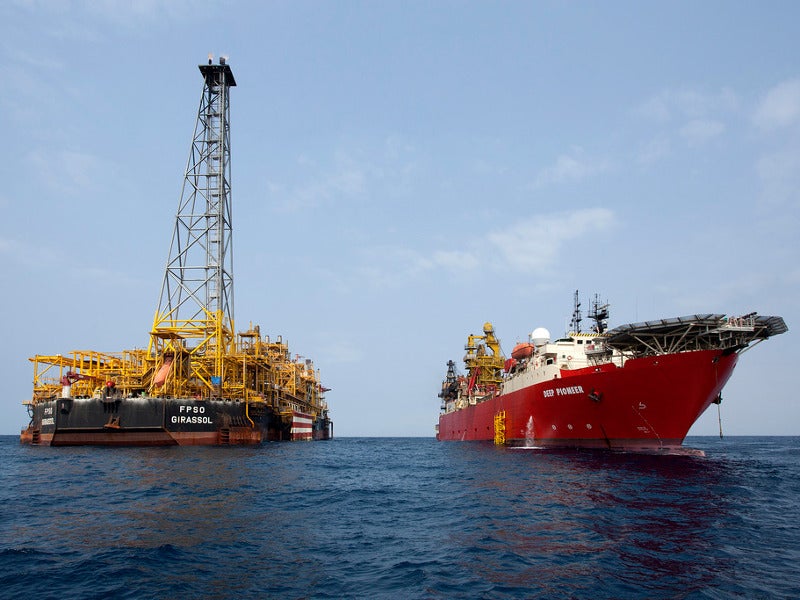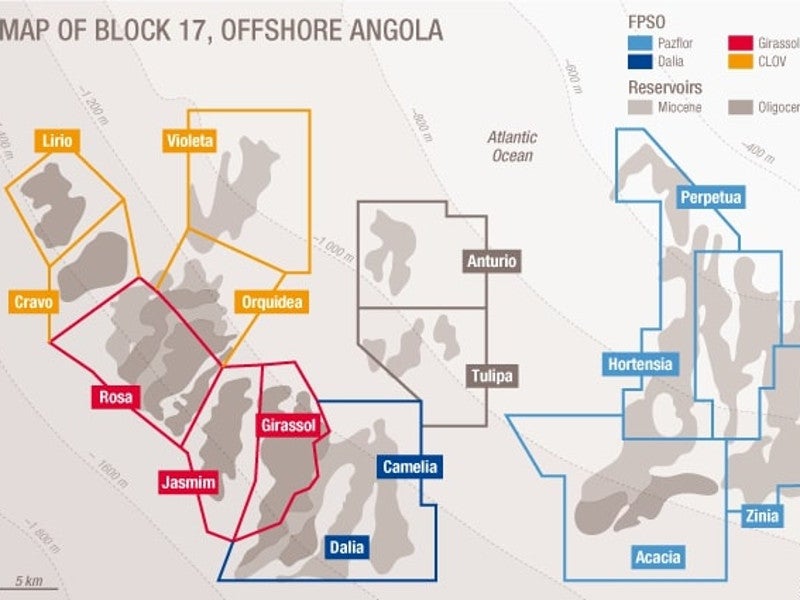Zinia phase II is a deepwater offshore project located in water depths ranging between 600m and 1,200m, approximately 150km off the coast of Angola.
The project lies in Block 17 offshore Angola, which is jointly owned by operator Total (40%), Equinor (23.33%), ExxonMobil (20%) and BP (16.67%).
Zinia phase II is being developed as a satellite field to the Pazflor field complex, which is also located in the same block.
In December 2017, Total entered contracts with the state-owned oil company Sonangol, the concessionaire of Block 17, for the development of Zinia Phase II project.
Scheduled to come on stream in 2021, Zinia Phase II is expected to produce 40,000 barrels of oil per day (bopd).The final investment decision on the $1.2bn project was reached in May 2018.
Zinia geology and reservoir details
Block 17 has two independent reservoirs from Oligocene and Miocene era that are present at depths up to 1,400m under water. The oil extracted from Oligocene deposits is lighter with 35o to 38oAPI compared to the thick and heavier Miocene oil with 17o to 22oAPI.
The Zinia field comprises Miocene oil deposits.
Angola’s Block 17 fields
Angola’s Block 17, to which Total entered in 1997, hosts four major field complexes, namely Girassol, Dalia, Pazflor and CLOV (Cravo, Lirio, Orquidea and Violeta). Each of these fields is developed with a separate floating production storage and offloading (FPSO) facility.
Girassol, which came on stream in 2001, was the first field to be developed in the Block 17. It was followed by the commissioning of Dalia and Pazflor in 2006 and 2011, respectively.
The Zinia Phase I was developed as part of the Pazflor field development that also included three other fields, namely Hortensia, Perpetua and Acacia.
The $6.1bn CLOV was the latest mega-development project in the area. It involved the development of Cravo, Lirio, Orquidea and Violeta fields through the deployment of the fourth FPSO on Block 17. First oil from the CLOV project was achieved in June 2014.
Block 17, which has produced more than 2.6 billion barrels of oil to date, is popularly called Golden Block, due to its high productivity. The current daily average oil production of the block is 700,000 barrels.
Zinia phase II development details
Zinia phase II development encompasses 600km² and will include a total of nine development wells tied-back to the existing Pazflor FPSO facility. Five out of the nine wells will be oil producers, while the remaining four be water injectors.
The Zinia phase II wells will be tied-back to the Pazflor FPSO through a new subsea pipeline network, which will include a 10.3km-long electric heat tracing (EHT) pipe-in-pipe flow line with 11in inner diameter, a 13.6km-long water injection line with 8.5in inner diameter, and a 10.5km-long non-insulated gas lift line with seven-inch inner diameter.
The new subsea production lines will connect the wells to the existing P40L riser for the Pazflor FPSO.
The Zinia phase II project will involve a total of 49 tie-in works at the FPSO, which will include 31 cold and 18 hot works, apart from modifications to the existing water injection and gas lift modules of the FPSO.
The Zinia phase II project is expected to pave the way for potential tie-back of other satellite reservoirs to the existing FPSO facilities on Block 17.
Contractors involved
Total awarded the engineering, procurement, commissioning and installation (EPCI) contract, valued between $150m to $300m, to Subsea 7 for subsea flowlines and umbilicals in June 2018.
Subsea 7 will carry out the fabrication work in Sonamet’s yard located in Lobito in Angola, while the management and engineering services will be performed from it’s Global Project Centre in Paris, France, as well as from its local office in Luanda, Angola.
The scope of work includes subsea tie-back with the Pazflor FPSO, which will involve approximately 36km of flowlines and 21km of umbilicals.
Technip FMC secured the EPC contract for subsea equipment for the project in July 2018. Support services related to assembly, testing, mobilisation, and installation are also covered under the contract.
The project management is being performed by PBF Internal Portal and MentorIMC Group.






